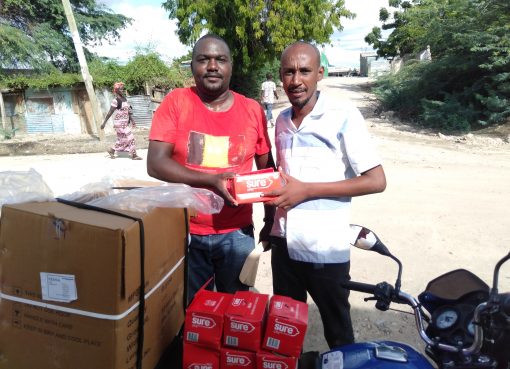At the centre of a 4 acre Acacia woodland in Baruti Village within Nakuru West Sub County, a dejected Christopher Tangus stares at empty 33 hollowed out log beehives.
The 71 year old is nostalgic of the past when he was an acclaimed owner of more than 200 beehives which in good years would bring him a healthy income by producing thousands of litres of honey. Over the years the number of hives he keeps has been steadily dwindling.
“In my youth I had only known bees as a source of income on my farm since they provided me with a produce to sell. All bee keepers in this village will tell you that the venture is no longer a sweet deal,” Tangus said at his Baruti farm.
Some 50 Kilometres away at Kuresoi North Sub-County, 61 year old Gabriel Maritim, has almost nothing to sell after harvesting just 12 liters of honey, down from his usual average of 3000 litres.
“I have managed beehives since 1981 but the venture is becoming unsustainable due to erratic rainfall patterns. We were told to take up bee farming as a way of broadening our income in the face of harsher weather, including heat, droughts and floods that can decimate crops. Bee keeping is not proving as climate hardy as farmers had hoped,” states Maritim.
Last year, only two of his 115 beehives had honey with the bees unable to find enough nectar from his parched trees and nearby fields amid widespread drought.
Experts warn that drought, coupled with decline in bee populations, deforestation and poor farming practices is causing a decline in honey production in the country.
Prof. Rhoda Jerop Birech, an expert in Sustainable Agriculture at Egerton University and a Board Member of Organic Consumers Alliance (OCA) noted that the importance of bees in the lives of humans is always underestimated and enough is not being done to protect the insects.
“While the world’s population is increasing day-by-day, the population of bees is steadily decreasing,” she warned
Prof. Birech singled out exposure to toxic chemical pesticides through insecticides, herbicides, fungicides and other synthetic toxins used in industrial agriculture as the biggest threats to bee health.
“One of the simplest ways to conserve our bee populations in an agriculturally reliant world is through organic farming. Organic farming standards largely prohibit use of synthetic pesticides and promote use of Integrated Pest Management (IPM) techniques. Some pesticides target the bee’s immune systems by making them defenseless against viruses.
She noted that devastating bee pathogens such as mites and viruses are being increasingly found in Africa. As a result she said bee health should now be a priority of national governments, development agencies as well as farmers and beekeepers.
Prof. Birech emphasizes that little to zero rain means lack of nectar, a key ingredient in the making of honey.
“Beekeeping is one of the most environmentally friendly agricultural practices. It requires no spraying or weeding like other farming. It’s not resource intensive. But bees relocate when they can’t find enough food to feed on. They die upon consuming the chemicals used to counter pest attacks in crops,” she says.
The scholar identified planting indigenous plants, growing a variety of flowering plants and practicing farming free from use of pesticides as some of the strategies to boost beekeeping in Kenya.
Muo Kasina, the Director of National Sericulture Research Centre, said drought has direct negative effects on bees’ food resources since it affects flowering periods.
“In addition, bees need a lot of pollen for their young ones and without flowers, there is no pollen hence populations of bees dwindle,” said Kasina.
The Egerton University don further notes that bees play a significant role in the pollination of fruit crops such as pawpaws, oranges and watermelons, which do well in arid regions increasing food security in the country.
“Bees are critical in providing pollination to crops, therefore, without them, we would not have food. Seventy-five percent of all crops grown for food rely on pollinators, mostly honey bees, for a successful harvest. Without pollination from honey bees, many fruits and vegetables will not be on our grocery shelves,” she said.
A researcher at South Eastern Kenya University’s school of agriculture and veterinary sciences, Benedict Wambua established in a study that recurrent droughts were among the factors limiting the use of beekeeping as a climate coping strategy, largely because honey production fell in drought periods.
“Extreme climatic effects lead to low or postponed plant flowering time, reduces pollen and nectar availability, increases water stress, (and) inhibits movements and bee communications. During the prolonged dry spell, bees migrate and leave empty hives,” stated Wambua
On his part, the Nakuru County Governor, Lee Kinyanjui sought to reassure farmers that the National Agricultural and Rural Inclusive Project (NARIGP) being implemented in five sub-counties namely Kuresoi-North, Molo, Naivasha, Njoro and Bahati will transform bee keeping into a profitable venture.
The County NARIGP Coordinator, Njoroge Githunguri said the project is designed in an innovative way that brings together the National, selected County Governments and World Bank to chart ways of empowering small-holder farmers economically for social inclusivity.
“The programme is aimed at enhancing a smooth, scrutinized flow of operations by various stakeholders across the beekeeping value chain and will consist of various players including beekeepers, scientists, processors and marketers among others. This will boost quality and quantity of honey and its products in the country,” said Githunguri
Kinyanjui said his administration was working with all stakeholders in a bid to ensure quality production and an expansion of both local and international markets.
Currently, the bee sector is manned by different departments, including forestry, livestock, crops, natural resources, depending on responsibilities.
By Jane Ngugi




